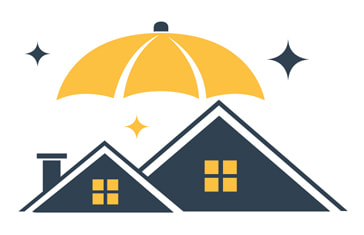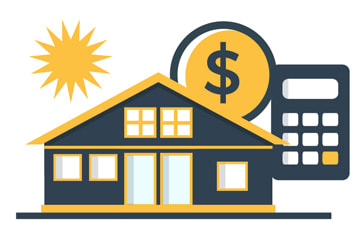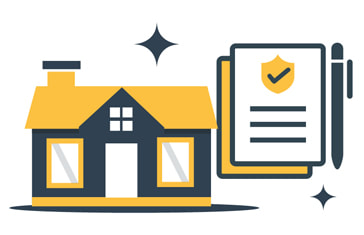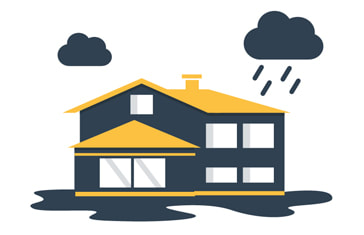Compare Home Insurance Policies
Our guide explains everything you need to know to get the best policy at the lowest price.
Updated 18 July 2024
Summary
Useful resource: We've compared house insurance policies side-by-side to make it easier to see where you're covered, and where you're not. Download our policy comparison table in XLS (Google Sheets).
- House insurance renewals are going up and up. This is because of increased risk, a 55%+ increase in the Natural Hazards/EQC (earthquake) levy, increased building costs, higher risks of natural disasters and increased crime which causes property damage. As outlined in this RNZ story in August 2023, "it's as bad as it ever has been to be an insurance buyer" given these costs.
- New Zealand has many natural hazards, or risks, including floods, earthquakes, and landslips. Some places are riskier to live than others, as they experience more natural hazards. In the past, insurers would price insurance 'equally' based on the property size, regardless of its location. Now, insurers are facing higher costs to insure and are moving to price insurance specific to a property's location and history. These costs are being passed on home owners.
- Because of recent events, house insurance costs continue to rise, while homeowners in Christchurch and Wellington, in particular, are facing difficulties in getting appropriate insurance for their home given long-standing issues.
- We have priced home-only insurance, and not included contents cover. We found even $25,000 of contents cover could increase some policies by 15% to 60%. Given house insurance's ongoing price rises, and how a number of New Zealanders are struggling to afford it (as reported in this Stuff article), our focus is on house-only.
- We review policies from eight well-known insurers, and compare them side by side. Our House Insurance Quotes show the most attractive policies for example properties in major cities - Auckland, Hamilton, Tauranga, Wellington, Upper Hutt, Lower Hutt, Wellington, Lower Hutt, Nelson, Christchurch and Dunedin.
- Significant savings can be found by following simple tips, including having an accurate sum-insured amount and an appropriate excess.
Useful resource: We've compared house insurance policies side-by-side to make it easier to see where you're covered, and where you're not. Download our policy comparison table in XLS (Google Sheets).
Know this: Why house insurance increasing
- Many homeowners in certain parts of New Zealand have seen significant changes in their house insurance policies. While both Natural Hazards/Earthquake Commission (EQC) and Fire Service levies have increased, this is not causing the reported cases of some policy renewal costs doubling
- The reason is primarily the risk and occurrence of earthquakes, floods, cyclones, coastal damage and crime. Tower Insurance and AIG (which owns AMI, NZI and State) introduced 'full risk-based pricing' back in mid-2018. This means that insurers now don't 'share' the risk with less-risky policyholders. Instead, if you own a house in an area with a higher risk of earthquakes, you will pay more for insurance.
- 2023 has been claim-heavy with floods and cyclone damage throughout highly populated parts of the North Island. If you are in a troubled area (including Christchurch, flooded Auckland suburbs, Kaikoura or Wellington), this may mean insurance is more difficult to obtain and expensive, as outlined by our sample quotes guide and media reports.
To help you compare and make an informed decision, this guide covers:
Related resources: Our trusted go-to guides for Insuring an Old House and Difficult Areas for House Insurance explain what you need to know should either of these issues apply to you.
Advertising Disclaimer: MoneyHub may earn a referral bonus for anyone that’s approved through some of the below links. Our research and findings are independent of any bank, credit card issuer, or product manufacturer/service provider, and have not been endorsed by any of these entities. Please see our Advertising Policy for more details about how we make money.
- Compare House Insurance Quotes New Zealand-wide
- House Insurance Must-Know Facts
- Suburbs and Areas of New Zealand Where it's Difficult to Insure Homes (and Ensuring a Home is Insurable)
- Frequently Asked Questions
- Ready to Buy House Insurance?
- How to Make a Claim on Your House Insurance
- Why Does House Insurance Cost What it Does?
Related resources: Our trusted go-to guides for Insuring an Old House and Difficult Areas for House Insurance explain what you need to know should either of these issues apply to you.
Advertising Disclaimer: MoneyHub may earn a referral bonus for anyone that’s approved through some of the below links. Our research and findings are independent of any bank, credit card issuer, or product manufacturer/service provider, and have not been endorsed by any of these entities. Please see our Advertising Policy for more details about how we make money.
Compare House Insurance Quotes With Our Top Insurers
|
Are you looking for contents insurance, or insurance for an investment property?
How Much Should I Insure My House For?
In the video below, MoneyHub Founder Christopher Walsh explains how house insurance calculators work and why you must ensure you have enough coverage every time you renew or switch insurers:
- This guide is not for you - visit our contents insurance guide or landlord insurance guide.
- If you are looking to estimate the rebuild cost of your home or an investment property, our house insurance calculator explains everything you need to know.
How Much Should I Insure My House For?
In the video below, MoneyHub Founder Christopher Walsh explains how house insurance calculators work and why you must ensure you have enough coverage every time you renew or switch insurers:
MoneyHub Founder Christopher Walsh Explains How Our Friends at Initio Offer Instant Quotes Based on Your Address:
|
Christopher Walsh
MoneyHub Founder |
|
Compare House Insurance Quotes New Zealand-Wide
- Well known insurers such as AA Insurance, AMI, AMP, Initio, State, Trade Me and Tower all sell house insurance.
- Each policy referenced below is "home only", no contents are included. The quotes are for a single-story, brick and tile roof property with a sum insured value of $700,000
- We obtained quotes for nine properties in locations all over New Zealand.
- We've compared house insurance policies side-by-side to make it easier to see where you're covered, and where you're not. Download our policy comparison table in XLS (Google Sheets).
Property specifics:
- Owner-occupied
- Policy holder age = 41 years
- Free standing home, concrete slab foundations, built 1980
- Flat/gentle slope of land
- 1 Story
- Standard construction
- No previous claims in the last three years
- Double brick exterior with terracotta tiles
- Floor area of 180 metres squared
- Standard security with a monitored burglar alarm
- Four bedroom, one bathroom, one deck, one kitchen and a two car garage
Disclaimer: Specific House Insurance policies and their terms and conditions differ between insurers. We make no representation that the quotes below imply that the policies are the same in form and substance. Please review policies in detail before making any decision.
Auckland Home Insurance Price Comparison - June 2024
Location |
Initio Excess: $400 |
Tower Excess: $500 |
AA Insurance Excess: $500 |
AMP Excess: $500 |
AMI Excess: $500 |
State Excess: $550 |
TradeMe Excess: $500 |
Takapuna |
$2,088.75 |
$2,307.39 |
$2,124.81 |
$1,944.64 |
$2,524.51 |
- |
$2,634.44 |
Mt Wellington |
$2,088.75 |
$2,105.52 |
$1,908.38 |
$1,985.57 |
$2,423.41 |
$2,222.8 |
$2,392.55 |
Mangere |
$2,088.75 |
$2,192.36 |
$1,924.17 |
- |
$2,579.67 |
$2,347.06 |
$2,183.96 |
Waikato Home Insurance Price Comparison - June 2024
Wellington Home Insurance Price Comparison - June 2024
South Island Home Insurance Price Comparison - June 2024
Location |
Initio Excess: $400 |
Tower Excess: $500 |
AA Insurance Excess: $500 |
AMP Excess: $500 |
AMI Excess: $500 |
TradeMe Excess: $500 |
|
Christchurch |
$2,802.24 |
$3,336.13 |
- |
- |
- |
- |
$3,803.68 |
Nelson |
$2,292.34 |
$3,075.85 |
$3,085.59 |
$2,034.76 |
$3,055.65 |
$2,800.33 |
$3,550.96 |
Dunedin |
$2,088.75 |
$2,402.04 |
$2,388.23 |
$1,951.21 |
$2,277.99 |
$2,129.37 |
$2,748.19 |
Invercargill |
$2,088.75 |
$2,703.02 |
$2,865.88 |
- |
$2,431.28 |
$2,072.50 |
$3,105.80 |
Summary
- If you're serious about switching insurers, or want to negotiate a better deal with your existing one, compare compare compare. It's the only way to have any bargaining power when it comes to bringing down the cost of house insurance.
- If you live in Christchurch or the Wellington region, insurers will generally take longer to come back with a quote, but persist and compare, and if required, talk to an insurance broker specialises in house insurance
- We expect house insurance prices to change throughout 2024 and beyond as insurers charge natural disaster-prone areas more, (as announced in this Stuff.co.nz article) relative to low-risk areas. This means low-risk areas will pay relatively less, as is already being seen in the sample quotes above.
- Useful resource: We've compared house insurance policies side-by-side to make it easier to see where you're covered, and where you're not. Download our policy comparison table in XLS (Google Sheets).
Compare Policy Details
- We've compared house insurance policies side-by-side to make it easier to see where you're covered, and where you're not. Download our policy comparison table in XLS (Google Sheets).
- Disclaimer: This policy comparison is not intended to be financial or insurance advice. It is a summary of the various policy terms of coverage only. For full details of policy coverage, terms, benefits and exclusions please refer to the specifc policy wording document.
Compare House Insurance Quotes With Our Top Insurers
|
House Insurance Must-Know Facts
A house insurance policy covers everything 'fixed' to your home and propertyHouse insurance covers everything fixed to your property, so having the right level of cover is important, as is understanding the differences in policies.
Your home includes all of the following items which are owned by you:
|
Know what house insurance doesn't cover
We strongly suggest checking the small print carefully before you buy any policy. |
If how you 'use' your house changes, it may be a 'change of circumstances' and the insurer will need to knowInsurers are constantly assessing their risk, and an event or decision you make may constitute a 'change in circumstance'. If this is the case, your insurance company may need to know. This can include:
It is always smart to be on the same page as your insurer - if one of the above applies, a quick phone call will let you know where you stand. Be sure to take a note of the outcome and confirm it in an email to your insurer. Since 2020 there has been a rise in 'working from home' - house insurance policies cover this in most cases. However, here's what you need to know about 'material changes' to home use:
Know this:
|
You’ll save the most by prepaying house insurance annuallyInsurers love being paid upfront, so if you know your living situation won't change in 12 months, you can likely save 10%-20% by paying upfront. It may be a cash hit but it's free money by way of savings, and if you do cancel the policy later on the unused months are fully refundable.
Some policies allow situation changes, such as moving property, if you have prepaid for a year. In such instances, the insurer will usually either quote an additional amount to pay or issue a refund if the new premium is lower. |
Many factors affect what your policy costsThere are a number of factors which insurers take into account when pricing house insurance. This includes home-specific and applicant-specific information:
Home-specific:
Applicant-Specific
|
Get other quotes BEFORE you renew every yearInsurers, like many electricity companies and broadband providers, often offer the best deals to new customers. Loyal customers are punished with higher rates, which usually increase each year. Our guide to House Insurance Quotes has current prices for a range of sample properties all over New Zealand - get your own quotes and see how much you can save. You can then contact your insurer and tell then you plan to switch.
The New Zealand house insurance market has three dominant players - IAG (which owns AMI, NZI, State and Lumley), Tower and Vero. Despite that, independents such as Initio and Trade Me (which is a Tower product) are challenging the insurance market despite having a small market share. |
Know the seven ways to save on house insurance
|
Understand EQC (Earthquake Commission) cover and its limitsImportant: The Earthquake Commission (EQC) has become the Natural Hazards Commission Toka Tū Ake, reflecting its role in supporting New Zealanders to prepare for, and recover from, a range of natural hazards, not just earthquakes.
The new name is one of a raft of changes introduced by the new Natural Hazards Insurance Act that came into force on July 1 2024 per this ODT article. Historically, all house insurance policies include a fee that is paid to the Earthquake Commission (EQC). The EQC provides insurance cover, known as EQCover, which applies when an earthquake or other natural disaster occurs. Cover includes:
Other covered events For other covered events, such as floods and storms, EQCover will only cover damage to your land. Direct EQCover
|
Reduce the risk of theft and home damage with these easy-to-implement tips...
|
Always check the policy's cover, terms and conditions carefully before signing upIt's important you understand the policy, what it covers and what it doesn't. If you are unsure, contact the insurer and ask them to explain it. Additionally, we suggest the following:
|
Compare House Insurance Quotes With Our Top Insurers
|
Suburbs and Areas of New Zealand Where it's Difficult to Insure Homes
Our trusted go-to guides for Difficult Areas for House Insurance explains what you need to know should this issue apply to you. A summary is below:
Across New Zealand, there are now specific areas and regions where insuring homes isn't always straightforward, particularly when trying to secure coverage instantly online. Our research highlighted several regions and cities where getting home insurance is difficult. We list these and explain the reasons that contribute to the difficulty below:
Be Aware: Houses built before 1935 in Wellington, Christchurch, North Canterbury, and Marlborough: As a background, before 1935, New Zealand had no set of building standards, which means older homes, especially those constructed before 1935, may not have been built to the same structural standards as newer buildings. This makes them more vulnerable to damage from earthquakes and other natural disasters, and many insurers won't cover them, as first reported in this 2012 Stuff.co.nz article.
Know This: While the above regions are some of the most well-known areas with insurance complexities, hundreds of other pockets around the country present unique risk layers.
Across New Zealand, there are now specific areas and regions where insuring homes isn't always straightforward, particularly when trying to secure coverage instantly online. Our research highlighted several regions and cities where getting home insurance is difficult. We list these and explain the reasons that contribute to the difficulty below:
- Wellington: As the capital city located near major fault lines, Wellington faces significant seismic risks. The city's hilly terrain and coastal exposure also contribute to its susceptibility to landslides and tsunamis, which increase the already significant risk to home insurers. It can cost up to four times more to insure an identical house in Wellington as it does in Auckland.
- Porirua: Similar to Wellington, Porirua is located near active fault lines, making earthquake risk a primary concern. Its coastal areas are also prone to sea-level rise and storm surges.
- Lower Hutt & Upper Hutt: Being part of the wider Wellington region, these areas are also vulnerable to earthquakes. Moreover, river flooding due to the Hutt River poses an additional threat, especially during heavy rainfall.
- Marlborough Sounds: This region has intricate waterways, peninsulas, and islands. Its topography and relative isolation make accessibility a challenge, increasing the risk of delayed assistance during emergencies and unknown rebuilding costs. Add in coastal nature and flood risks, and it can be a problem to insure in general.
- Whangarei: Whangarei and some areas of Northland face risks associated with coastal hazards, including rising sea levels and storm surges. However the biggest risk concern are the slope severity hazards (landside and instability) that makes insuring houses on the outskirts of Whangarei sometimes difficult to insure. In addition its tropical climate also makes it susceptible to cyclones and intense rainfall.
- Westport: Houses in Westport township face heightened flood risks due to its precarious position between the Orowaiti Lagoon to the Buller River. Investment by Council in the local flood protection infrastructure is necessary before insurers will adjust their risk appetite here. The remoteness of the West Coast also poses access issues which insurers take into account.
- Hawkes Bay: Pockets of the Hawkes Bay including Eskdale, Wairoa and Fernhill recently suffered major flood damage. Many areas have been re-classified by Council. Houses throughout the Hawkes Bay have come under increased scrutiny by insurers when accepting new policies. The area also has a history of earthquakes and this is also a major factor in the assessment of risk.
- Christchurch's Eastern Suburbs: Southshore and New Brighton: The 2010 and 2011 Canterbury earthquakes left an indelible mark on Christchurch, with the eastern suburbs being some of the hardest-hit areas. The repercussions of these events have led to significant insurance challenges in regions like Southshore and New Brighton.
Be Aware: Houses built before 1935 in Wellington, Christchurch, North Canterbury, and Marlborough: As a background, before 1935, New Zealand had no set of building standards, which means older homes, especially those constructed before 1935, may not have been built to the same structural standards as newer buildings. This makes them more vulnerable to damage from earthquakes and other natural disasters, and many insurers won't cover them, as first reported in this 2012 Stuff.co.nz article.
Know This: While the above regions are some of the most well-known areas with insurance complexities, hundreds of other pockets around the country present unique risk layers.
Checklist for Potential Buyers: Ensuring a Home is Insurable
If you're considering purchasing a home anywhere in New Zealand, it's essential to understand the insurance complexities in various regions. Before making an offer, determine whether the home is insurable and at what cost. To help you proceed with confidence and efficiency, our step-by-step checklist covers what you need to be aware of:
1. Location Evaluation:
2. Historical Assessment:
3. Use Technology to Cover the Unknown:
If there are no red flags by completing the above, there are still other in-personal and third-party checks to complete:
1. On-site Visit:
2. Consultation:
3. Environmental Risks:
If there are no red flags at this point, more checks are needed:
Inspection:
Final Decision:
Related resources: Our trusted go-to guides for Insuring an Old House and Difficult Areas for House Insurance explain what you need to know should either of these issues apply to you.
1. Location Evaluation:
- Research the suburb/area: Does it fall into any regions listed with insurance complexities?
- Even if a suburb isn't listed in the high-risk areas, there are hundreds of other pockets around the country with unique risk layers.
- If it's high risk, home insurance will be more problematic to secure.
2. Historical Assessment:
- Check the construction year of the house: If built before 1935, especially in Wellington, Christchurch, North Canterbury, or Marlborough, it may be more challenging to get insurance.
- Understand the historical events of the region: Has the area experienced significant natural disasters in the past?
- If the home is pre-1935 and/or in a natural disaster area, home insurance will be more problematic to secure.
3. Use Technology to Cover the Unknown:
- We suggest inputting the address into initio to get instant feedback on potential insurance concerns - initio's database is unrivalled and a strong starting point to unearth any issues. Please be aware that initio is a partner of MoneyHub and if you purchase a policy we may receive a referral fee.
- If you are looking to purchase a new property we suggest not only getting an instant quote from Initio (to see if there are any red flags, e.g. a slope severity warning), but spending a couple of minutes getting to the payment page. If you make it there you will be able to download a certificate confirming your ability to get insurance. This is something Banks are requiring of certain properties.
If there are no red flags by completing the above, there are still other in-personal and third-party checks to complete:
1. On-site Visit:
- Check for visible signs of structural damage or repairs.
- Evaluate the home's positioning in relation to potential flood zones, landslide areas, or proximity to the coast.
2. Consultation:
- Spot-check other properties in the same street using initio to understand if other homes have faced issues. Are there any common issues they encounter?
- Facebook groups of local community members are useful resources for asking about street or neighbourhood-specific home insurance experiences.
3. Environmental Risks:
- Review geological reports: Look for potential seismic activities, landslide risks, and flooding patterns.
- Assess the vulnerability to coastal hazards, such as rising sea levels, storm surges, and cyclones.
- As an example, Auckland Council launched a tool in August 2023 for anyone to check the flood risks of an address per this RNZ article .
If there are no red flags at this point, more checks are needed:
Inspection:
- A Building Inspector report will assess the home's structural integrity, the current condition, susceptibility to regional risks, and any recommended fortifications or repairs.
- Ensure the home complies with the latest safety and structural standards.
- Inquire if the home has ever been denied insurance coverage and, if so, why.
Final Decision:
- Weigh the pros and cons of purchasing the home based on its insurability.
- Consider future resale potential - if the house is challenging to insure now, it may be more difficult to sell later.
- For all of the above reasons, it's essential to clearly understand your potential home's insurability before committing to purchase.
Related resources: Our trusted go-to guides for Insuring an Old House and Difficult Areas for House Insurance explain what you need to know should either of these issues apply to you.
MoneyHub Founder Christopher Walsh Explains How Our Friends at Initio Offer Instant Quotes Based on Your Address:
|
Christopher Walsh
MoneyHub Founder |
|
Compare House Insurance Quotes With Our Top Insurers
|
Frequently Asked Questions
What is average house insurance cost in New Zealand?
There is no average price; every home is different. Throughout New Zealand, insurers vary their quotes based on the size of the home, location, age of home, materials used to build the home, section angle and many other factors. The best way to find the best house insurance deal is to review our house insurance quote comparison and get your own quote directly with the insurers.
What is the best house insurance?
Our review of house insurance quotes outlines the most common policies available in New Zealand, and sample costs.
What is covered by a house insurance policy?
House insurance covers the cost of rebuilding or repairing your home if it is damaged or destroyed. External garages, garden sheds and fences are also covered, as is the cost of replacing things like pipes, cables and drains. The costs of demolition, site clearance, and architects' fees are also covered by house insurance.
Commonly throughout New Zealand, most people need to claim on their house insurance when there is loss or damage caused by:
Commonly throughout New Zealand, most people need to claim on their house insurance when there is loss or damage caused by:
- An earthquake
- A fire
- A flood
- Vandalism
- Theft causing property damage (i.e. broken windows)
- Frozen and burst pipes
- Fallen trees
- Land subsidence (i.e. sea-facing properties)
How much insurance cover do I need for my house?
You need enough cover to pay for a complete rebuild. If disaster strikes and you don't have enough cover, you will have to pay for the difference between the cover and total rebuild cost yourself. Our House insurance calculator guide outlines exactly what you need to know to get an appropriate level of cover.
Is house insurance a requirement?
No, unless you have a mortgage over your home (see below). House insurance is however recommended given the number of natural disasters that put New Zealand under threat, as well as the risk of fire or flooding. Because a home is likely to be most New Zealand's biggest asset, spending $700 to $1,500 a year protecting it should be a priority.
Is house insurance included in a mortgage?
No - but many banks and mortgage brokers will try and sell house insurance as part of the lending process. Our view is to shop around, as banks and mortgage brokers make plenty of commission from selling policies, which may not be the best available in the market.
Do I need house insurance if I rent?
No - house insurance is the responsibility of your landlord to protect the buildings. You can consider contents insurance, but this not required either.
Do you pay house insurance monthly or yearly?
Most insurers offer monthly, quarterly and annual payment options. Be aware that in some cases, paying monthly can mean you pay 10-15% more, which we believe is far too high.
How will the excess affect the cost of my policy?
Each policy will be quoted with a compulsory excess, which many insurers let you adjust upwards or downwards before buying the policy. The excess is always outlined when you buy a policy, and generally, a higher excess will lower the cost of your insurance premium, and a lower excess will increase the cost of insurance. In our research, we found $500 was the most common standard excess.
When you select your excess, consider what you could afford tomorrow if disaster struck. If your limit was $500 or $750, a similar excess would be more appropriate than selecting a $1,500 or $2,500 excess, even if you pay more annually for a policy.
When you select your excess, consider what you could afford tomorrow if disaster struck. If your limit was $500 or $750, a similar excess would be more appropriate than selecting a $1,500 or $2,500 excess, even if you pay more annually for a policy.
Should I buy contents insurance separately or combine it with house insurance?
If you to insure your contents as well, our guide to house and contents insurance explains more. If you do buy a combined policy, make sure you check the details carefully. Some insurers may have a separate excess for both parts of your policy, which means a claim affecting both the structure of your home and its contents, such as a flood or fire, will result in a double excess. Be sure to check a policy for this limitation.
Can you change your house insurance anytime?
Yes - if you move house you can cancel and be refunded any prepaid time on your policy. You can also increase or decrease your sum insured cover at any time; the insurer will re-calculate your policy cost based on the new amount.
Ready to Buy House Insurance? Know How to Get the Best Deal
Once you’ve become familiar with the basics and have decided to purchase house insurance, it’s time to get the best quote for what you need. Unlike travel insurance or life insurance, there are no price comparison websites for house insurance.
Get the best policy without becoming overwhelmed by the details
Tip 1 – Read our Best Buy House Insurance policies below to get an idea of price and coverage
We have put together a number of house insurance quotes from AA Insurance, AMI, AMP, ANZ, Inition, State, Trade Me, Tower and Westpac for a number of properties all over New Zealand. The purpose is to help everyday New Zealanders to understand the cover level and make it easier to pick the right policy while reducing the chance of overpaying for cover.
Tip 2 - Check your policy cover and excess
Make sure the policy quote offers the right level of cover, and consider what excess levels or extra coverage you are happy with. Generally, a higher excess coupled with lower coverage (in dollar terms) equals a cheaper quote, but it's essential to make sure the cover level is sufficient when buying house insurance (or any insurance for that matter).
Tip 3 – Lower the excess only if you are comfortable paying more for a policy cost
If you have the right level of cover, you can pay less for a policy by choosing to have a higher excess. However, it's important to make sure you can afford the excess if and when you need to make a claim.
Get the best policy without becoming overwhelmed by the details
Tip 1 – Read our Best Buy House Insurance policies below to get an idea of price and coverage
We have put together a number of house insurance quotes from AA Insurance, AMI, AMP, ANZ, Inition, State, Trade Me, Tower and Westpac for a number of properties all over New Zealand. The purpose is to help everyday New Zealanders to understand the cover level and make it easier to pick the right policy while reducing the chance of overpaying for cover.
Tip 2 - Check your policy cover and excess
Make sure the policy quote offers the right level of cover, and consider what excess levels or extra coverage you are happy with. Generally, a higher excess coupled with lower coverage (in dollar terms) equals a cheaper quote, but it's essential to make sure the cover level is sufficient when buying house insurance (or any insurance for that matter).
Tip 3 – Lower the excess only if you are comfortable paying more for a policy cost
If you have the right level of cover, you can pay less for a policy by choosing to have a higher excess. However, it's important to make sure you can afford the excess if and when you need to make a claim.
MoneyHub Founder Christopher Walsh Explains How Our Friends at Initio Offer Instant Quotes Based on Your Address:
|
Christopher Walsh
MoneyHub Founder |
|
How to Make a Claim on Your House Insurance
In almost every case, making a claim will be an easy process. Knowing your house insurance policy’s excess level and terms and conditions will limit any nasty surprises. To have the best experience when making a claim, follow these steps:
If your claim is rejected, appeal and complain
- Insurers ask to be contacted as soon as possible when there is damage or a loss. You will need to be able to pay the excess for the claim to be processed. Generally, insurers require you to:
- Provide full details of the situation - the time and date, reason or cause etc.
- Provide evidence of the loss - photographs of the damage to your home, a police report etc.
- In the case of earthquake damage, your home may not be accessible for days, weeks or even months while the damage is assessed. Do not enter your property in this time.
- In the case of flooding, it can take weeks (or longer) for a property to dry out.
- Report any sewage issues or hazards to your local city or district council.
- Do not attempt to make any repairs yourself - always contact your insurer and arrange for an approved professional to do any work that is covered. If it's an emergency and your insurer cannot fix the problem, contact a qualified plumber, electrician or builder. You can keep the receipts and claim on these.
- If you have the right level of cover, your house insurance policy will pay out for any damage incurred. Most policies also cover alternative accommodation (hotels, motels, etc.) if you cannot access your property.
If your claim is rejected, appeal and complain
- Your insurer should inform you, in detail, why the claim was rejected and how it falls outside your policy.
- If you disagree, jump on the phone and explain why your claim meets the T&Cs of the policy you bought.
- If the insurer still refuses to cover your claim, ask your insurer for a "letter of deadlock". This letter lays out why the insurer disagrees with your claim. Once you have the letter of deadlock, you can access the Insurance & Financial Services Ombudsman Scheme which resolves disagreements between customers and their insurers.
- Their free-of-charge service will make the final decision about your claim and order the insurer to pay out if they find in your favour.
- If your insurer isn't a member, you can complain to Financial Services Complaint Ltd who follow a similar process.
Why Does House Insurance Cost What it Does?
To help explain where your money goes when you pay for a policy, we've outlined a brief guide to demystifying your house insurance premium:
Insurers use the following factors, among others, to calculate your premium:
1. Location
2. Water supply and emergency services
3. Age of the property
4. Use of the property
5. Replacement value
6. Excess and extras
7. Government Levies
8. GST
- Insurance policies rely on wording that is often fraught with jargon, giving them a reputation for being both convoluted and confusing.
- Something as important as insuring your house should come with some certainty – so how do you demystify this? Many MoneyHub readers ask how their premium costs are calculated, and where the costs go.
- The premium cost is variable: a rental property in Auckland, for example, will likely have a cheaper premium than an equivalent property in Christchurch due to earthquake risk. Based on the big data leading house insurance company Initio shared with us on their claims, many factors determine premiums – some of these things include relative exposure to weather events, flood zones, vulnerability to theft and the historical record of claims in the area.
Insurers use the following factors, among others, to calculate your premium:
1. Location
- An insurance premium is heavily dependent on the likelihood of earthquakes and storms, based on historical data.
- Many insurers moved to risk-based pricing in 2018, meaning that low-risk places like Hamilton will no longer subsidise higher-risk regions such as Napier.
2. Water supply and emergency services
- The closer a house is to a fire station, and the better the access a property has to water, the less likely it is to burn to the ground. A property 30 minutes out of town relying on rainwater tanks will attract a higher premium.
3. Age of the property
- This can affect premium pricing. For example, houses built before 1935 are more likely to have claims than those built afterwards because they are more likely to have corroding electrical wiring, old pipes that can’t cope with increased town water pressure, and original roofing more susceptible to storm damage.
4. Use of the property
- Data indicates that houses occupied by their owners have fewer losses than those occupied by tenants or short-term guests. A rental property attracts landlord risk (such as malicious damage and loss of rents) so a landlord insurance policy will always cost at least 20% more than the relatively insurance rating for an owner-occupied home.
- Holiday homes sit for longer periods of inoccupancy, which increases other risks such as unnoticed water damage, break-ins and burglary.
5. Replacement value
- The greater the insured value of a property, the higher the premium. The increase in premium isn’t linear – so a $1,500,000 rebuild value doesn’t attract double the insurance premium of a $750,000 rebuild.
- After a certain point, the cost of insurance increases at a decreasing rate, reflecting the fact that over 95% of insurers’ claims are for smaller loss (e.g. up to $10,000) not total losses requiring a complete rebuild.
6. Excess and extras
- An excess is the amount the property owner is willing to absorb at claim time. The more the owner is willing to pay, the lower the risk to the insurer – and the lower the premium cost.
- Extras that increase the premium are the additional covers the property owner adds, e.g. increasing loss of rents from $20,000 to $80,000 for a rental property, or adding nil excess glass cover.
7. Government Levies
- A government earthquake levy is added to the insurance cost of every residential property, to cover for natural disasters losses to dwellings and land up to $345,000, which increased from $172,500 in late 2022 per this EQC announcement.
- This is currently set at $552 per residential unit, the earthquake levy covers $345,000 of the loss. Anything over $345,000 is paid for by the insurance company. In this way, your insurer collects your EQC levy as part of your total insurance cost and passes them onto the Earthquake Commission.
- The second type of levy included in your premium is another fixed component cost: the Fire and Emergency Service Levy. This levy contributes toward the cost of running emergency services (fire brigade, ambulance service, etc.) of which residents of New Zealand collectively share the benefit.
- Like the earthquake levy, the fire levy is charged on each residential unit at a rate of $106 + GST per living unit, and an additional $21.20 + GST if cover for contents is included in your policy. In the same way, your insurer collects the fire levy as part of your insurance premium and passes those funds onto the NZ Government. The levies are outlined on the Fire and Emergency Service's website, and will increase in mid 2024.
- Unlike the EQC, if you choose not to have residential property insurance, you will still benefit from the fire and emergency services, even though you have not directly contributed to these services.
8. GST
- Like all domestic goods and services in New Zealand, a 15% GST tax is then applied to the total insurance cost (insurer premium, Natural Hazards/EQC levy, and Fire levy). This total becomes the cost of your insurance policy premium that is payable by you, the insurance customer.
- So for a house insurance premium of $1,200 including GST (which is common), around $670 of this amount pays the levies. Around $510 is left over, which, net of GST, is around $443. This is retained by the insurer to pay claims, reinsurance and staff and distribution costs.
Compare House Insurance Quotes With Our Top Insurers
|







































